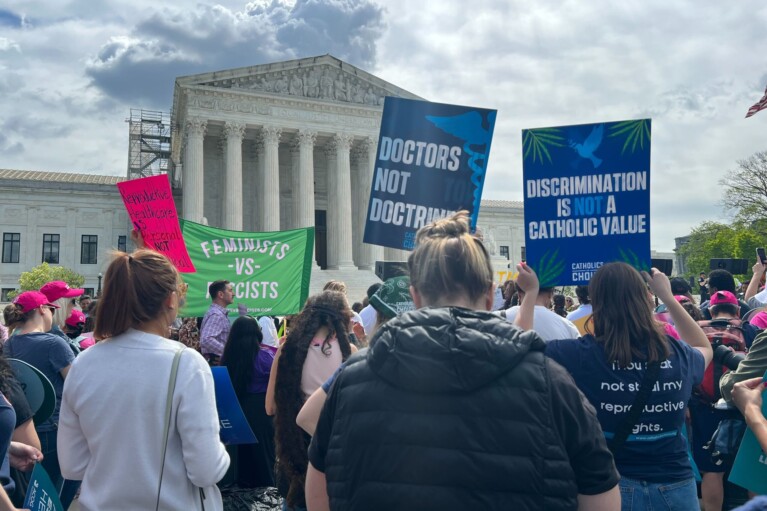Trone and Winnefeld: Opioids Killed Our Loved Ones. We’re Taking Action to Prevent Further Tragedy.

By Rep. David Trone (D-Md.) and retired Admiral James Winnefeld, Jr.
David Trone represents Maryland’s 6th District in Congress and is co-chair of the Commission on Combating Synthetic Opioid Trafficking. In 2016, he lost his nephew, Ian, to a fentanyl overdose.
James A. Winnefeld is a retired United States Navy admiral who served as the ninth vice chairman of the Joint Chiefs of Staff from August 2011 to July 2015. Winnefeld lost his son, Jonathan, to an accidental overdose. He is a founder and co-chair of SAFE Project, a non-profit organization working to reverse the addiction fatality epidemic.
For two years our nation has demonstrated its ability to rally together for a common cause. The vast majority of Americans have worn masks and been vaccinated. The federal government has invested trillions of dollars in families, businesses, and communities to sustain the economy and provide life-saving medications and vaccines. Everyday heroes have worked on the front lines to keep us safe and healthy. Despite some shortcomings, our response to the COVID-19 pandemic has been a powerful display of our capacity to respond to a nationwide threat.
Another public health crisis, the opioid epidemic, is largely ignored but demands our wholehearted focus and an all-out effort. Most know someone who struggles with substance use. We know what needs to be done to fix it. We know we have the responsibility — and the capacity — to deal with a public health crisis of this magnitude. Yet our national response has been severely lacking, prolonging the crisis and the pain.
Our fight to end this deadly epidemic began long before we were appointed to serve on the national Commission on Combating Synthetic Opioid Trafficking. Like so many families, this issue is personal for us: we both experienced the tragic loss of a loved one to an opioid overdose. Our grief and our frustration with years of insufficient response made this a shared priority.
The commission brought together leaders from across the executive branch, subject-matter experts, and members of Congress. Our broadened perspective led to a deeper understanding and a strengthened commitment to act. We witnessed counterfeit pills shipped through a mail sorting facility at JFK Airport, met with Mexican officials in Mexico City, and spoke to American officials on the ground along the southern border. We performed countless hours of investigation, received classified briefings, and poured over thousands of pages of research. What we found should serve as a wake-up call to our leaders and the American people.
It is impossible to overstate the deadly effects of this crisis. Since 1999, more than one million Americans have died from drug overdoses — far more than all of the U.S. service members killed in battle in every war throughout our nation’s history. The number of our citizens lost to opioids each year is more than double the number killed by firearms, motor vehicle accidents, or suicide.
And the epidemic is only getting worse: from July 2020 to June 2021, more than 100,000 Americans died from a drug overdose, up almost 30% from the previous year. Over 60,000 of the overdoses involved synthetic opioids like fentanyl. These numbers will only continue to grow if we don’t take action.
The lasting impact is on our economy as well as on the families affected. In 2018, overdose fatalities cost the United States an estimated $696 billion. With the rise in overdose deaths in years since, it is reasonable to believe fatal overdoses now represent a $1 trillion annual cost.
The recently released commission report includes these key findings:
- The large majority of synthetic opioids being trafficked into the United States come from Mexico, manufactured using materials sourced from the People’s Republic of China.
- The production of these deadly drugs evades detection, having evolved from heroin grown in large fields to chemical compounds fabricated in small labs.
- Because its potency is so much greater than heroin, the smaller amount of fentanyl or its analogs required to satisfy demand is far more difficult to detect when crossing our border — whether by land, mail, or other means.
No one-size-fits-all solution to this problem will work; its multiple, interwoven solutions are too complex. Reducing supply has been and will continue to be ineffective on its own. The same is true if our only focus is on reducing demand. By adopting a holistic approach, combining supply reduction with prevention, treatment, and recovery support, we can effectively reduce demand within our own borders. But even that alone won’t be enough.
During his first State of the Union Address last week, President Biden outlined his new Unity Agenda – comprised of four key priorities that are bipartisan in nature and therefore much more likely to gain a secure footing in promising legislation. Notably, the first of which was titled “Ending the Opioid Crisis.” In this address broadcast to Americans in every corner of the country, the President’s inclusion of this epidemic – and a call to extinguish it – was a welcomed beacon of hope for many of us who have, for years, called for stronger action on this issue. We look forward to working with the president to further this objective and, ideally, turn some of the commission’s evidence-based recommendations into reality.
A necessary next step is to return the Office of National Drug Control Policy to cabinet level. We should empower and fund law enforcement and public health officials to make a real difference in tackling both supply and demand. We should become a leader on the international front by incentivizing other nations to take action, promote intelligence sharing, target drug manufacturers and traffickers, and broaden existing anti-corruption and anti-violence efforts.
And, perhaps most importantly, we must address the stigma that for too long has prevented action on this deadly issue and the underlying mental health issues that lead to addiction. We are now working with Republicans and Democrats, the Biden administration, and others to fashion legislation that will turn these recommendations into law.
It’s time for the United States to take control of our own destiny on this issue.
Too many Americans are dying. Too many families like ours are devastated by tragic and preventable loss.
Only by setting politics aside, leveraging the best available ideas, and renewing our commitment to the common good will we eliminate this severe threat to our prosperity and security.




 Creative Commons Attribution
Creative Commons Attribution